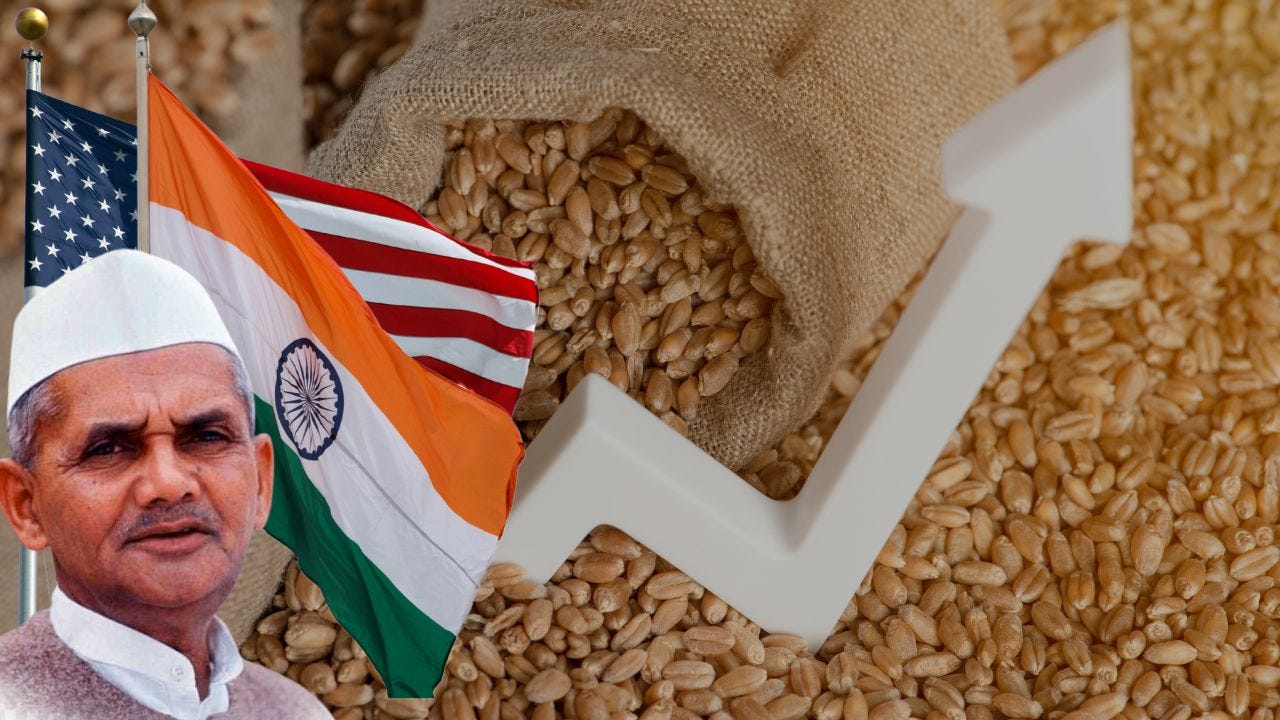US-India Food trade - Ghosts of PL 480
Trump insists that India reduce tariffs on US farm produce and allow US GMO products, among other things. But the ghosts of PL 480 weigh in. Let's discuss.
One of the central points of discussion concerning the US-India trade deal relates to agriculture and farm produce. Trump insists that India should reduce the tariffs on farm produce and allow the sale of GMO food products from the US. Without going into the details of US-India trade, we need to understand the agricultural restrictions through the lens of what happened under the PL 480 scheme.
A brief on PL 480
In the early 1950s, a newly independent but severely depleted India faced substantial food shortages. The predatory practices of colonialism had impaired the agricultural ecosystem to such an extent that the poor couldn't get any food. After WW2, the British refused to release India's wartime surplus; thus, there was not enough capital for agricultural investment. Hence, a beleaguered India approached the US for food aid in the 1950s.
At that time, the US sent food aid to India under the PL480 scheme. To feed the starving Indians, the US supplied wheat meant for animal feed called Milo Wheat. The grains received under the scheme were of such poor quality that even the Indian animals refused to eat them as feed. The supplies also included hardened weeds (highly invasive Parthenium grass) that further depleted crop yields. As a cash-starved country facing famines and hunger, India did not have much choice.
To add insult to injury, the US threatened to with-hold all food-aid to subdue India's defence after Pakistan attacked India in 1965. The Indian Prime Minister Lal Bahadur Shastri asked the nation to eat only once a day to ensure the army had enough food.
But the US did not stop there.
As Johnson made the US's surplus food a tool of statecraft, using it as a bargaining chip to secure support for American foreign policy goals, the most striking example of it was India.
While India fought and won battles against Pakistan, monsoon waged another war with India with a series of failures. The result was a drastic 20 per cent fall in the national grain production — from 89.4 million tonnes in 1964–65 to 72.3 in 1965–66. Facing severe famine, India desperately needed US food aid.
Johnson got the opportunity to leverage this situation to pressure India, which had infuriated the US by criticising American bombings of Hanoi and Haiphong during the Vietnam War. He made critical famine aid to India conditional upon assurances that "the Indian government would implement agricultural reforms and, crucially, temper [its] criticism of US policy regarding Vietnam".
The Indian mildly protested saying its position was not different from what the United Nations and the Pope had said on the bombings by the US in Vietnam, Johnson reportedly said, "The Pope and the [UN] Secretary-General do not need our wheat."
In Indian culture, this is the lowest of the insults. And it hurt.
And 50 years later the ghosts live on.
For anyone who remembers this insult, we do not want to be dependent on US food. We will buy it when we want and at a price that we want.
Today, India is reasonably self-sufficient in food. We have occasional shortages which we procure from outside world. We buy food from across the world - Apples, almonds and other food products from the US, Avocados from the Aussies, strawberries from Europe and NZ. We also buy cocoa, coffee and many other food items from Africa, South America and many other places all over the world. But we buy them on our terms.
We are now a leader in grains such as rice and wheat, spices, sugar, tea, milk and dairy products. We can produce and sustain this country without any help from the outside world. We can ensure 800 million people get access to food and meals even when the world shuts down in a pandemic. And we are proud of it.
In Sum
More than half a century later, the bitter taste of that strategic leverage still lingers in India's collective memory, shaping our commitment to food sovereignty. This historical episode serves as a powerful reminder: for a nation to truly stand on its own feet, especially in a world of shifting geopolitical alliances and economic pressures, fundamental needs like food security must remain firmly within its own control. As global trade dynamics evolve, the "ghosts of PL 480" underscore a timeless truth – independence is not just about political freedom, but the self-reliance that protects a nation's people from being used as pawns in a larger game.
Sources
Firstpost Article: PL-480: When US choked food aid to shape India’s foreign policy
Congress Grass: How the US gifted India a frankenspecies that's gobbling up land




We can never trust the US. It's a monster. It hosts military chief of nuclear rogue nation like Pakistan, but lectures the world on democracy. This crisis will be turned to opportunity by India to be self sufficient in manufacturing.
Mind-blowing article. As someone born after 2000s, we never knew of this